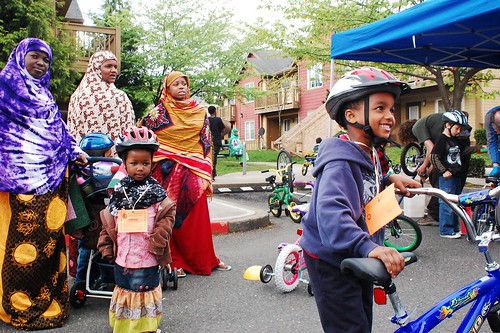Building Total Health – Kaiser Permanente Community Fund Grantee Summit
 By Alison Graves, Executive Director
By Alison Graves, Executive Director
What is total health and how do we build it? That was our charge on Monday, May 21, at the Kaiser Permanente Grantee Summit. More than 300 people gathered from dozens of organizations from around Oregon and Washington, all funded through the Kaiser Permanente Community Fund.
Thanks to the Kaiser Permanente Community Fund, we have been working with with Hacienda Community Development Corporation and New Columbia since 2010 to collaboratively design culturally-appropriate bicycle programs that seek to address the concerns uncovered in our Understanding Barriers to Bicycling Project.
The fund is administered through the Northwest Health Foundation (NWHF), another local leader in promoting innovative approaches to improving health. Both Kaiser and NWHF believe in focusing on the social determinants of health, which, simply stated, recognize that health begins where we live, learn, work and play and that all people should have the opportunity to make the choices that allow them to live a long, healthy life, regardless of their income, education or ethnic background.
Several themes emerged at the summit:
- Having improved data to demonstrate both the needs and the challenges, illustrated by the Coalition of Communities of Color’s ground-breaking research about health disparities.
- Working in collaboration with others, including non-traditional partners, as described by the work initiated by the Oregon Public Health Institute, which brought us together with a variety of organizations ranging from Bureau of Planning and Sustainability, Village Gardens, Hacienda CDC, Rose CDC, Community Alliance of Tenants and Urban League.
- Recognizing and addressing institutional racism in our work and in our organizations.
- Working at multiple levels in the community ranging from individuals to neighborhoods to organizations to public policy.
Getting to total health means looking holistically at the system and working together to improve access to education, jobs, healthcare, among others. Clearly, this is a huge task. But the hundreds of people in that room work on this every day and dedicate millions of dollars to building healthier communities.
Toward the end of the day we brainstormed solutions to get to total health. Although we cannot claim that we developed the specific plan, we certainly made great progress thanks to this unique opportunity.